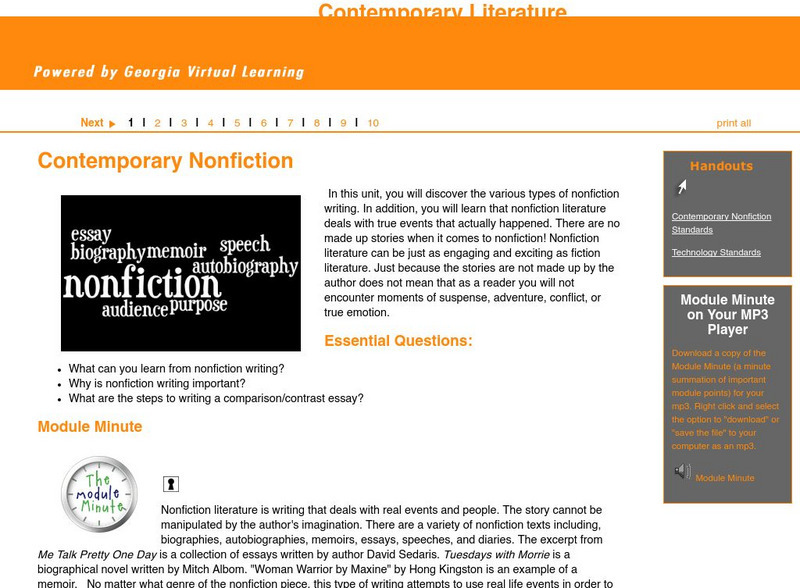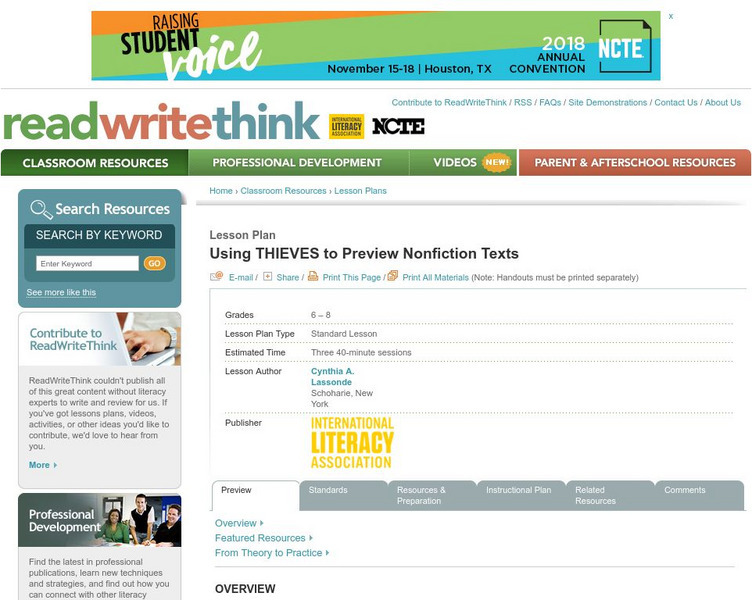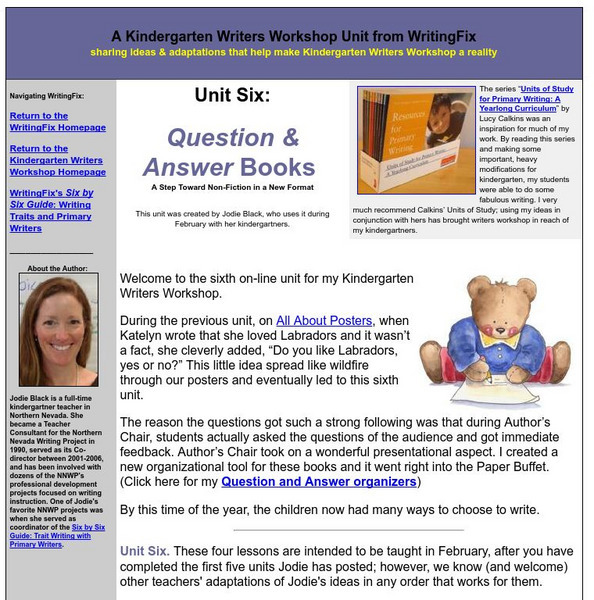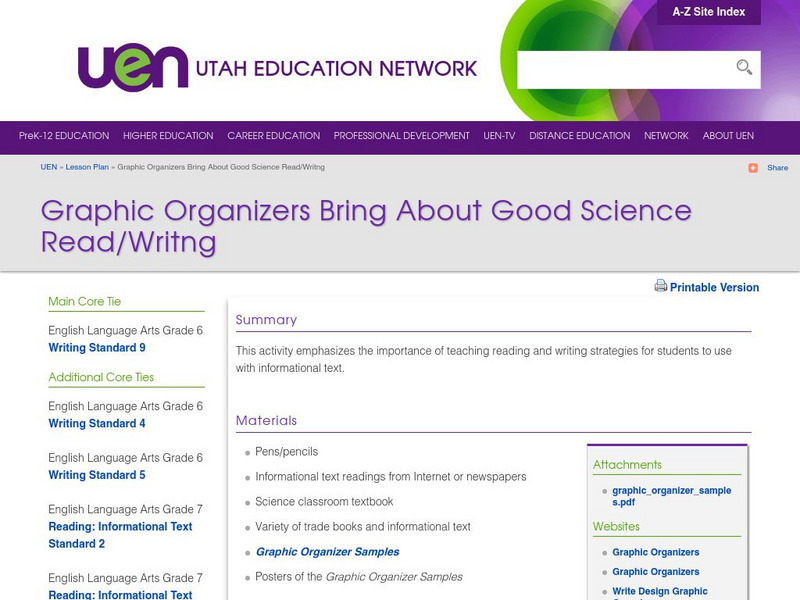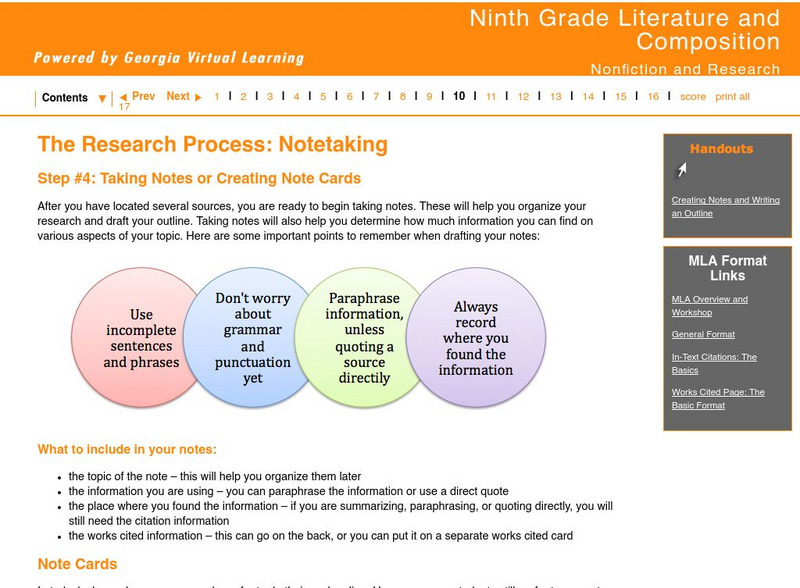Hi, what do you want to do?
Curated OER
Memories
Fifth graders collect artifacts of their fifth grade school year and make a technology based Memory Book.
Curated OER
K Is for Keelboat
Fifth graders investigate the significance of the keelboat in the Lewis and Clark expedition. They define the key themes of the expedition and classify them in prescribed format, an ABC book.
Curated OER
Bryant Creek Watershed Project - Making a Karst Dictionary
Students explore the definitions relevant to Karst topography. They develop a Bryant Watershed Dictionary of the special words and terms that are used to talk about the topography and hydrology of the area they live in.
National First Ladies' Library
Fitness for Life
Learners discuss their favorite activities and determine which activities are suitable for older people. In groups, students research the benefits of aerobic exercises and the equipment needed. Learners share their information with the...
National First Ladies' Library
Science: The Purloined Letter
Students examine Edgar Allan Poe's "the Purloined Letter" from the perspective of a profiler. To sharpen search procedures, they examine the text and make lists of items and places in the house that were searched. Then students discuss...
Curated OER
The End
Students listen as the teacher reads a story. Pictures are displayed as the teacher reads the story. Students jot down ideas for the story ending, and create an illustration to compliment their story. Student story endings and...
National First Ladies' Library
Are We There Yet?
Students study the wide-reaching effects of the Cold War, even to its involvement in domestic road construction. They research the National Defense Highway System (Eisenhower Highways) for information about the creation of the program,...
Curated OER
A View of Yourself Through Famous Writers
Students research famous quotes and discover one that describes themselves. They consider topics such as family and hobbies that will help others understand them. They present their information to the class.
Curated OER
Making a Karst Dictionary
Students practice using the correct vocabulary in geology and hydrology. They use the Internet to research topics and practice their researching skills.
Curated OER
Freckle Juice
Working in groups of four, the students will use the computer to draw an imaginary potion that will cure other children their age from physical traits (they can not control) including all ingredients and one text box.
Scholastic
Scholastic: Nonfiction Writing Lessons
This series of nonfiction writing lessons was developed by Stuart Miller. Four activities include: Describing the Real World, The Interview, Writing a Profile, and Writing a Review.
ReadWriteThink
Read Write Think: Blending Fiction and Nonfiction
Contains plans for four class periods that ask students to blend narrative and expository writing after reading fiction and nonfiction selections. In addition to student objectives and standards, these instructional plans contains links...
Georgia Department of Education
Ga Virtual Learning: Contemporary Literature: Contemporary Nonfiction
This lesson is an introduction to contemporary nonfiction including the definition, types of nonfiction: biographies, autobiographies, memoirs, essays, speeches, and diaries, examples of authors and types, key terms, essential questions,...
TES Global
Tes: Non Fiction Unit 4 Formal/impersonal Writing: Tourists
[Free Registration/Login Required] Students will analyze tourism brochures to determine features related to nonfiction writing in this unit. Tourism websites may be used in lieu of the brochures. Cotswold and the North Leigh Roman Villa...
Scholastic
Scholastic: Investigating Nonfiction Part 3: Independent and Guided Reading
This article provides tips for using nonfiction with guided reading and independent reading. The following strategies are shared: ways to help kids select "just right" nonfiction books; lessons to use with nonfiction in guided reading...
ReadWriteThink
Read Write Think: Using Thieves to Preview Nonfiction Texts
Contains plans for three lessons that introduce a nonfiction prereading strategy with the acronym THIEVES, which stands for Title, Headings, Introduction, Every first sentence, Visuals and vocabulary, End Questions, and Summary. In...
ReadWriteThink
Read Write Think: Animal Study From Fiction to Facts
Contains plans for five 50-minute lessons that ask young scholars to compare and research information about animals from fiction and nonfiction texts. In addition to student objectives and standards, these instructional plans contains...
Writing Fix
Writing Fix: Question and Answer Books
Beginning writers work through a Writing Workshop format to create Question and Answer books. A series of mini-lessons, graphic organizers, possible texts, and samples of student work are all provided.
Utah Education Network
Uen: Graphic Organizers Bring About Good Science Read/writing
This lesson uses graphic organizers to engage students in reading comprehension strategies for informational text in science. Venn Diagram, Hierarchy, Time Line, Cluster Diagram, and Flow Chart reproducible pages are included with the...
ReadWriteThink
Read Write Think: Comparing Fiction and Nonfiction With Little Red Riding Hood
Contains plans for nine 50-minute lessons that center around different versions of "Little Red Riding Hood." In addition to objectives and standards, this instructional plan contains links to PDF handouts and sites used in the lessons as...
Georgia Department of Education
Ga Virtual Learning: Nonfiction and Research: The Research Process: Notetaking
This lesson focuses on taking notes for your research project. It explains what to included in your notes and how to write them. It offers a link to The Quality Writing Center: "Creating and Using Outlines" and Study Guides and...
ReadWriteThink
Read Write Think: Identify, Compare, Write Nonfiction
Lesson that introduces the concepts of nonfiction to elementary students. Through reading and interactive lessons, students engage the genre of nonfiction and begin to write their own examples.
ReadWriteThink
Read Write Think: Comprehending Nonfiction Text on the Web
Contains plans for three lessons designed to improve comprehension of nonfiction, especially nonfiction texts on the web. It focuses on identifying text features, locating specific information, and generalizing that information. In...
ReadWriteThink
Read Write Think: Reading/writing About Whales Using Fiction and Nonfiction Texts
Young scholars will have a whale of a good time in this lesson in which they use fiction and nonfiction texts to write a letter to an online scientist.

















